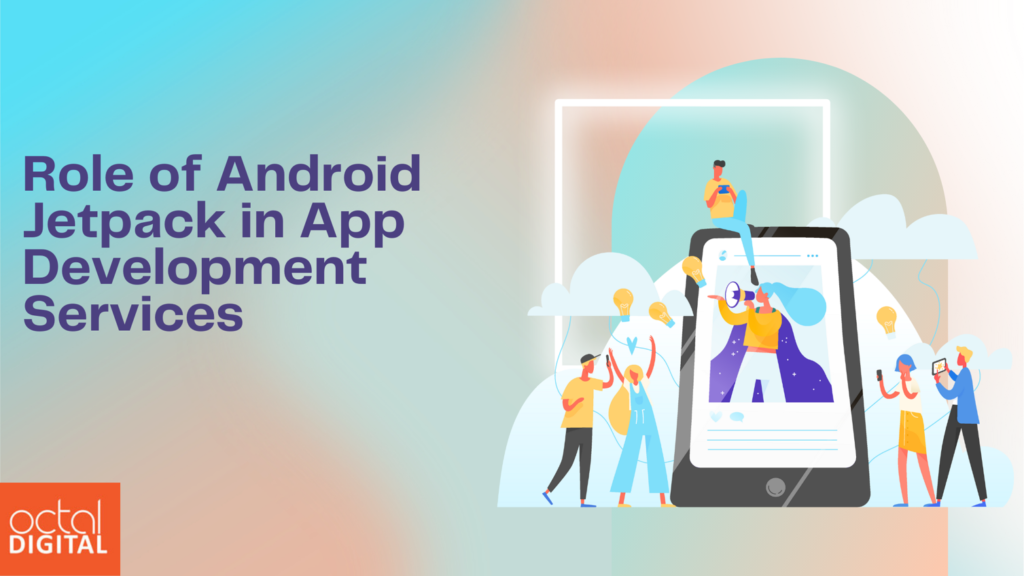The Role of Android Jetpack in Streamlining App Development Services

In the expansive realm of Android app development services, Android Jetpack stands as a comprehensive suite of libraries, tools, and architectural guidance. Its pivotal role in the development services landscape lies in addressing common challenges faced by developers, offering a standardized and efficient approach to building robust Android applications.
Android Jetpack Components
Foundation Components
AppCompat Library
The AppCompat library is an essential component of Android Jetpack, designed to provide backward-compatible UI components. This allows developers to create applications with a consistent look and feel across various Android versions, mitigating fragmentation challenges and ensuring a cohesive user experience.
Android KTX
Android KTX, tailored for Kotlin developers, simplifies code readability and conciseness. Leveraging Kotlin’s language features, it provides concise syntax and extension functions, reducing boilerplate code and enhancing the overall development experience for Kotlin enthusiasts.
Architecture Components
ViewModel
The ViewModel component, a part of the architecture components, plays a crucial role in managing UI-related data. It survives configuration changes, reducing the need for complex lifecycle handling. By separating concerns, ViewModel promotes clean architecture, making UI components more maintainable and testable.
LiveData
LiveData, an observable data holder, introduces a reactive programming paradigm to Android development. It facilitates the propagation of changes in the app’s data to UI components, ensuring real-time updates and a seamless user experience.
Room Database
Room Database addresses local data persistence, providing a SQLite abstraction layer with compile-time SQL queries. Its integration with LiveData simplifies database interactions, making it a powerful solution for efficient local data storage in Android apps.
Behavior Components
Navigation Component
The Navigation Component simplifies app navigation by providing a declarative way to manage fragment transactions and handle deep linking. It streamlines the implementation of navigation patterns, contributing to a more intuitive and maintainable navigation structure.
WorkManager
WorkManager offers a modern solution for managing background tasks in Android apps. Supporting deferred execution, constraints, and guaranteed execution, it is instrumental in handling tasks like data synchronization and periodic updates, contributing to a smoother user experience.
Connect with us for cutting-edge solutions that redefine your mobile app experience! Discover how Octal Digital streamlines Android app development services, providing the best app solutions.
UI Components
Fragment
Fragments, as modular UI components, enhance code modularity and reusability. They allow developers to break down complex UIs into smaller, manageable components, promoting a modular and maintainable architecture.
ConstraintLayout
ConstraintLayout provides a flexible and powerful layout design for Android apps. Its constraint-based approach enables developers to create responsive and adaptive layouts, accommodating diverse screen sizes and orientations.
Contribution to Android App Development Services
Accelerating Development
Android Jetpack’s extensive set of components significantly accelerates development by offering ready-to-use libraries and reducing the need for boilerplate code. Developers benefit from standardized tools and patterns, allowing them to focus on building features rather than dealing with infrastructure concerns.
Simplifying Maintenance
The modular and organized structure promoted by Android Jetpack simplifies code maintenance. With well-defined components like ViewModel and LiveData, developers can easily understand and update code, reducing the likelihood of bugs and making long-term maintenance more efficient.
Ensuring App Quality
The architecture components of Android Jetpack contribute to building high-quality Android apps. ViewModel and LiveData facilitate the creation of responsive and stable user interfaces, while Room Database ensures efficient local data storage. The result is an app that not only performs well but also provides a reliable and enjoyable user experience.
Best practices for Android Jetpack
● Modularization:
Break down your app into modular components using Jetpack’s modular architecture. This promotes code reusability, and maintainability, and allows for independent development and testing of modules.
● ViewModel Usage:
Utilize the ViewModel component to store and manage UI-related data, ensuring data survives configuration changes like screen rotations. This helps in maintaining a clean separation between UI and business logic.
● LiveData for Observing Data Changes:
Use LiveData to observe changes in your data and update the UI accordingly. LiveData is lifecycle-aware and helps prevent memory leaks by automatically cleaning up observers when the associated lifecycle is destroyed.
● Room for Database Handling:
Employ the Room Persistence Library for local data storage and handling. Room provides an abstraction layer over SQLite and facilitates smooth interactions with your app’s database.
● Navigation Component:
Leverage the Navigation Component for simplified navigation between fragments and activities. It provides a visual editor in Android Studio, making it easier to manage navigation graphs.
Conclusion
In conclusion, you are now aware of how Android Jetpack is impacting the Android app development services. Be it UI-based integration or quick app integration, including easy maintenance and development support, one should open up ways to explore its potential!
Transform your app development journey with Octal Digital, a leading mobile app development company in Houston. From addressing challenges to ensuring efficiency, we offer implementation of the latest tech stack and industry best practices.
